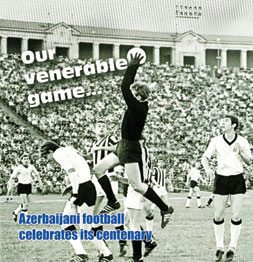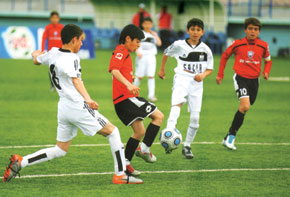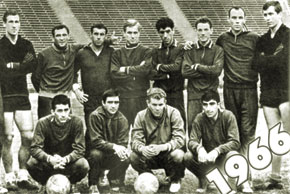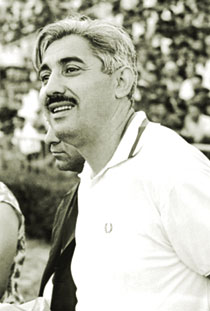Pages 90-95
by Rovshan Binnatli
There are very few countries that do not play football and the game reached Azerbaijan in 1911, 48 years after its ‘invention’. It is difficult to judge whether this was timely or somewhat belated: quality has always been more important than quantity. We should, however, remember that the history of football in Poland began in 1919, in Ireland and Japan in 1921 and in Iran in 1922; it reached Turkey and Bulgaria only in 1923, Greece in 1926 and Mexico in 1927. Time-wise, then, we were not so late. However, when it comes to all that has happened to our football over those 100 years… The century has been very hard on Azerbaijan and an oft-changing political situation has affected every sphere: instability and socio-political changes have surely had their affect on football. Most of the last 200 years of our history have been closely connected to Russia in one way or another and the influence of our northern neighbour is obvious in many spheres. In the early 20th century very few people in Russia engaged in sports and this also applied to all the countries under its imperial rule, including Azerbaijan. In those days our country had only two sports societies and one gymnasium, involving a total of 500 people. The most popular sports were horse riding and wrestling; the zorkhanas (where wrestlers trained and competed) attracted huge audiences. However, let us return to how football came to Azerbaijan.
We have already mentioned the Russian influence and football was not exempt. The first football match, between amateur teams, was held in Saint Petersburg on 13 September 1898. Researchers mark that date as the beginning of Russian football. Within a short time the game spread to countries under Russian rule, reaching Azerbaijan in 1911. Exactly 100 years ago.
We could divide the development of the game here into five periods: its introduction into the country and first organisation (1911-1914), the pre-Soviet era in Azerbaijan (1914-1920), from the establishment of Soviet government to the Great Patriotic War (1920-1941), post-war to the collapse of the USSR (1945-1991) and, finally, the years of independence (1992 to the present).
Football kicks off
What happened between 1911 and 1914 the period of introduction and first organisation? Research has turned up some controversial points. Many countries date the history of their football from the moment the game reached their land. However, most begin with the first championship or friendly match and Azerbaijan is one of these. Football was introduced to Azerbaijan before 1911 – in the early 20th century, as evidenced by articles in different publications of the time from Baku and Tbilisi (Georgia). However, we mark 1911 as the beginning of our national football because that is when football teams were officially approved and regular matches began.
Football had enchanted the world at the time and foreign, especially English, businessmen and oil experts, as well as businessmen from Moscow, Petersburg and various parts of Ukraine who had come to Baku, played a great role in the emergence of football and the formation of different teams in Azerbaijan. Balakhani Football Club, British Club, Stella, Progress, Sports Squad, Adamovists, Sportsman, Ascold and Congress were among our first football teams.
Back then the footballers’ kit was very different from the modern style, teams had no consistent line-up, team captains doubled as coaches and the referee could be anyone agreed by the two teams. Matches were arranged by mutual agreement, because there was not yet an organization or society to unite all the teams and organize official games. Sometimes there was nowhere to play. A 1913 edition of Baku’s Kaspi newspaper reported:
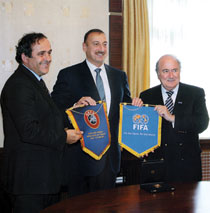 FIFA President Joseph Blatter and UEFa President Michel Platini present pennants to President Ilham Aliyev of Azerbaijan, 2007 At the request of footballers, Baku City Hall has allocated special land near the cemetery for a football field. The land has been given free for a year. However, as soon as the land is required, it is to be cleared immediately of new constructions and returned to Baku City Hall.
FIFA President Joseph Blatter and UEFa President Michel Platini present pennants to President Ilham Aliyev of Azerbaijan, 2007 At the request of footballers, Baku City Hall has allocated special land near the cemetery for a football field. The land has been given free for a year. However, as soon as the land is required, it is to be cleared immediately of new constructions and returned to Baku City Hall.
The year 1912 is a special one in the annals of Azerbaijani football: in that year British Club of Baku played Sokol (Hawk) of the Tbilisi Gymnastics Society. The game has gone down as Azerbaijan’s first international match and it ended in a 4:2 victory for our team. A year later the same two clubs met in Baku and the footballers from Georgia gained revenge with a score of 2:0. In the early years of footballing development in Azerbaijan, British Club were generally the strongest team. Their hegemony lasted for several years. However, as the years went by teams such as First Gymnasium School, Business School and Sportsman appeared. The first match between footballers from different cities in Azerbaijan was held in July 1912: a match between Shusha and a team made up of people spending their holidays in the regions of Baku attracted a huge crowd. Thus, the geography of football in Azerbaijan expanded year by year, month by month, even day by day. It was not surprising that the Russian press of the time noted this. On 25 January 1914, Moscow’s K sportu (To Sport) magazine wrote:
The Bakuvians, who love roller skating, have changed their focus of interest. Their favourite pastime now is playing football.
Organisation and independence
The Baku Football Union (BFU) was established in May 1914. A Board of Governors was established from representatives of existing clubs, as was a Referees’ Committee. One of the first important steps taken was to organize regular official matches and a city championship. The BFU fulfilled its responsibilities well and did everything possible to implement its plans: as a result, the clubs soon numbered 17, the city championship gained official status and regular friendly games were played against teams from other countries, especially from Georgia (in the period from 1911 to 1920 teams met 11 times, 6 of the games being won by Azerbaijan).
Even though football was introduced to Azerbaijan by foreigners, it was clear from the early years that locals were not indifferent to the game. It is true that it was rare to see local footballers in the first teams in Azerbaijan. Nevertheless there was great interest in the sport and the fact that hundreds of local fans watched the matches is firm evidence. However, it was a very unstable political period, the situation was difficult and confused, and there were many incredible twists and turns. This, of course, also affected football, a sport taking its first steps. The socio-political tension affected every sphere of entertainment, which almost ceased to exist, causing stagnation in football.
In May 1918 the first democratic state in the East – the Azerbaijan Democratic Republic, was established. This new state was to resolve numerous important and historic issues in terms of ideology, political thought and moral values. Football was not forgotten: at the time the only team continuing to play was Sokol of the Baku Gymnastics Society and they received the support necessary to travel to Surami city in Georgia in 1919, where a friendly international match finished in a 6:2 victory for our footballers, even though the opposition had invited several leading players from the Tbilisi national team for the game. In the same year of 1919, the Baku team had a match with one of the strongest teams in the Caucasus, Batumi, and scored 5 goals. On 28 April 1920, Azerbaijan lost its independence and the Soviet Union established its rule over the country, heralding the start of a completely different era in football…
Football was rejuvenated after Soviet government was established. Football organizations held regular meetings. The Baku Football Society (BFS) and a Board of Referees were created at a meeting held in Baku in January 1921 of representatives from all the football teams. One of the main aims of this new body was to increase the number of teams and teams such as Naval Service Sports Club, Bayil Workers’ Club and Ascold from the Railway Workers’ Club were soon formed. Tournaments were organised in three divisions, according to the relative strengths of the teams.
In fact the first years of Soviet rule were by military regime, thus there were many teams of soldiers. However, most youth were united in the Komsomol organization. The older generations also took part in the tournaments. The first Caucasus Olympics, organized in Tbilisi in May 1923, attracted an enormous crowd. Alongside teams from Tbilisi, Yerevan and Batumi, was the Komsomol team from Baku. Our footballers beat all three opposing teams and won the first Olympics (our players took the next two tournaments as well). This success gave Azerbaijan the right to participate in the 16-team football tournament in the First All-Russian Festival of Gymnastics; our compatriots reached the quarter finals.
Another interesting point from that time was that the press adopted a very sensitive approach towards football. The Molodoy Rabochiy (Young Worker) newspaper, even added a two-page Krasniy Sporstmen (Golden Sportsman) supplement; later the publishers replaced that two-page supplement with the 18-page Spartak magazine, which laid the foundations for sports journalism in the country.
The BFS was disbanded in January 1924, and its responsibilities were given to the football department of the Physical Education Board created under the Baku City Executive Committee. That year a record number of teams, 37, (29 in the previous year) competed in the Baku championship. And 58 teams fought for the title of capital champions in 1926.
A national league
The Azerbaijani league was initiated in 1928, 8 teams competing: there were three teams from the capital, along with teams from Khankendi, Ganja, Guba, Sheki and Zagatala. Baku’s Hemkarlar-2 (Colleagues) were the first Azerbaijani champions. Jumping ahead a little, I will mention that the history of the Azerbaijan Cup began in 1936; the first tournament being won by Janub Inshaatchi (Southern Builder).
Progress, noted for the quality of their play in the 1920s, were considered one of the strongest teams, not only in Baku, but in the whole Caucasus. Games involving Progress were followed across the USSR, the state of workers and peasants, There was special interest in their international matches, as a team of workers from Azerbaijan. The workers of Baku played teams from Germany in 1930 (4:3 and 1:0) and from England in 1932 (5:2 and 3:1). These matches were so popular that the stadiums could not accommodate all who wanted to watch.
However, Temp were the team of the thirties, representing Azerbaijan in the first USSR championship, held in 1936. In that first USSR Championship, Temp (in some sources the name of the team is given as Janub Inshaatchi, in others just Inshaatchi) played in the third division with 7 other teams and took second place in the spring season. Thus, they won the right to play in the second division in the autumn season, the second championship. However, when thinking of Azerbaijani football in the USSR championship, one immediately remembers Neftchi, because they were our leading club in the championship.
1966 and all that…
Neftchi played in the first division of the USSR championship in 27 out of 54 seasons and were 12th team in the USSR. Their most remarkable year was 1966: Neftchi beat Moscow Spartak 3:0 in the last game and took third place in the championship. There was another achievement that same year – Anatoly Banishevski, Azerbaijan’s best footballer of the 20th century, won a bronze medal as part of the USSR national team at the World Cup held in England. However, that is not all that happened in 1966. As one of the linesmen during the final between England and West Germany in the eighth World Cup, the Azerbaijani Tofig Bahramov made a historic and very responsible decision, which played a major role in the outcome of the match, and in deciding which team would become world champions. Our internationally famous referee was awarded FIFA’s Golden Whistle for his outstanding skills and excellent refereeing.
Currently Azerbaijan’s largest sports arena, the national stadium is named after Tofig Bahramov. A statue of the famous referee was unveiled at the entrance to the stadium on 13 October 2004. Joseph Blatter, President of FIFA, as well as representatives of UEFA and the England Football Association, participated in the inauguration ceremony. Geoff Hurst, who scored that goal, was also among the guests and shared his feelings with us:
It is a great honour for me to participate in this event. I think the decision made by Tofig Bahramov then was right, the ball was indeed in the net. We gained the title of world champions thanks to his correct decision. If he were here with us today, I would shake his hand with all my heart, unfortunately he is not with us anymore.
If we are to talk of referees, we must mention another Azerbaijani – Eldar Azimzade, who officiated in numerous football matches. We mention him not least because the football final of the 1980 Moscow Olympics was entrusted to him.
I would like now to return to our footballers and their remarkable achievements on the pitch. Azerbaijani football, marking its centenary this year, had most success in the 1960s. We have mentioned the highlights, but 1968 was also special, because in that year Azerbaijan had two teams in the first division of the USSR championship; Neftchi were joined by Dynamo from Ganja. This was the first and only time in our footballing history. In all, between 1936 and 1991 28 teams from Azerbaijan played in different divisions of the USSR championship; 9 of our footballers joined the USSR national team and 12 footballers were members of Olympic teams: Anatoly Banishevski was a bronze medal winner at the 1966 World Cup and a silver medallist at the 1972 European championship; Igor Ponomaryov won gold at the 1988 Olympics. Another fine representative of the school of Azerbaijani football was Alakbar Mammadov: he started (1948) and ended (1962) his football career as a player with Neftchi, but also played for Moscow Dynamo from 1954-1959 and was four times a member of the USSR championship-winning team. He scored 4 goals against AC Milan in a famous friendly game held at the San Siro stadium in September 1955. Some of our young footballers were members of World Championship-winning teams in Soviet times and we had juniors who were European Champions.
Independence regained, hopes renewed
From the early 1990s, after Azerbaijan regained its independence, a new period opened in our footballing life, just as in every other sphere of the country’s life. The Azerbaijan Football Federations Association (AFFA) was established in March 1992. In May 1994 it joined UEFA and a month later was granted membership of FIFA. Thus, the Azerbaijani national team gained the opportunity to participate in World and European championships, and club teams to partake in continental tournaments.
Today, our footballers’ performance is not good enough to satisfy fans. Our national team still struggles not to be bottom of the group in qualification rounds. In the period to 1 June 2011, the national team won only 7 of 82 elimination matches (1:0 against Switzerland, 4:0 and 2:0 against Liechtenstein, 2:0 against Slovakia, 2:1 against Serbia and Montenegro, 1:0 against Finland and 1:0 against Turkey), they lost 63 matches and the scoring record is 34:190. Nazim Suleymanov scored the first goal in official European Championship matches, in 1996 in a match against Slovakia (1:4). 17 more footballers from Azerbaijan have since managed to score in the World or European championships. Gurban Gurbanov was the most prolific, with 5 goals.
When it comes to clubs, the greatest sources of pride for us are the achievements in the Union Cup, competed for by the champions of the CIS and Baltic countries: Neftchi (2006), Khazar-Lankaran (2008) and Inter (2011) have all won this tournament. The main target for our clubs, however, is to get through one or more rounds of the Champions’ and Europa Leagues. In the last two seasons the fact that Karabakh was only one step away from the group matches (losing to Twente of the Netherlands and Germany’s Borussia Dortmund) gives us a certain hope and optimism for the future. Azerbaijan lies 37th of 53 countries in European club ratings.
And our endlessly loyal fans strongly believe in the day when Azerbaijan will achieve miraculous victories and the status of champions.
Azerbaijan is now recognised internationally as a sporting country. Our sports players have succeeded in the most influential and respected competitions, tournaments, championships and at the Olympic Games. Our country and its capital, Baku, has been host to many sports events: it has already become a tradition to hold World and European championships, as well as qualifying tournaments, including for the Olympic programme, in Azerbaijan. This has also included football. Back in 1985, when our country was part of the USSR, several matches were held in Baku during the junior World Cup. Then the matches were organised at the highest possible level, with all the conditions necessary for the footballers to practise and relax, as well as providing facilities for both Soviet and foreign journalists. Following the Coca-Cola FIFA Cup, João Havelange, President of the world’s football organization, along with the heads of the English, Mexican, Paraguayan and Nigerian teams, thanked Azerbaijan for the level of organization and hospitability.
Next year Baku will again be a centre of attention for the international community: the finals of the FIFA U-17 Women’s World Cup will be held in Azerbaijan’s capital city from 22 September to 13 October 2012. We hope very much that our football authorities and social groups will once again fulfil their mission and that visitors will leave Baku with the best feelings and impressions. We are also very hopeful that the footballers of Azerbaijan will hearten fans with victories.
About the author: Rovhsan Binnatli is a sports commentator on the Lider television channel and writer of analytical articles on football in Azerbaijan.
by Rovshan Binnatli
There are very few countries that do not play football and the game reached Azerbaijan in 1911, 48 years after its ‘invention’. It is difficult to judge whether this was timely or somewhat belated: quality has always been more important than quantity. We should, however, remember that the history of football in Poland began in 1919, in Ireland and Japan in 1921 and in Iran in 1922; it reached Turkey and Bulgaria only in 1923, Greece in 1926 and Mexico in 1927. Time-wise, then, we were not so late. However, when it comes to all that has happened to our football over those 100 years… The century has been very hard on Azerbaijan and an oft-changing political situation has affected every sphere: instability and socio-political changes have surely had their affect on football. Most of the last 200 years of our history have been closely connected to Russia in one way or another and the influence of our northern neighbour is obvious in many spheres. In the early 20th century very few people in Russia engaged in sports and this also applied to all the countries under its imperial rule, including Azerbaijan. In those days our country had only two sports societies and one gymnasium, involving a total of 500 people. The most popular sports were horse riding and wrestling; the zorkhanas (where wrestlers trained and competed) attracted huge audiences. However, let us return to how football came to Azerbaijan.
We have already mentioned the Russian influence and football was not exempt. The first football match, between amateur teams, was held in Saint Petersburg on 13 September 1898. Researchers mark that date as the beginning of Russian football. Within a short time the game spread to countries under Russian rule, reaching Azerbaijan in 1911. Exactly 100 years ago.
We could divide the development of the game here into five periods: its introduction into the country and first organisation (1911-1914), the pre-Soviet era in Azerbaijan (1914-1920), from the establishment of Soviet government to the Great Patriotic War (1920-1941), post-war to the collapse of the USSR (1945-1991) and, finally, the years of independence (1992 to the present).
Football kicks off
What happened between 1911 and 1914 the period of introduction and first organisation? Research has turned up some controversial points. Many countries date the history of their football from the moment the game reached their land. However, most begin with the first championship or friendly match and Azerbaijan is one of these. Football was introduced to Azerbaijan before 1911 – in the early 20th century, as evidenced by articles in different publications of the time from Baku and Tbilisi (Georgia). However, we mark 1911 as the beginning of our national football because that is when football teams were officially approved and regular matches began.
Football had enchanted the world at the time and foreign, especially English, businessmen and oil experts, as well as businessmen from Moscow, Petersburg and various parts of Ukraine who had come to Baku, played a great role in the emergence of football and the formation of different teams in Azerbaijan. Balakhani Football Club, British Club, Stella, Progress, Sports Squad, Adamovists, Sportsman, Ascold and Congress were among our first football teams.
Back then the footballers’ kit was very different from the modern style, teams had no consistent line-up, team captains doubled as coaches and the referee could be anyone agreed by the two teams. Matches were arranged by mutual agreement, because there was not yet an organization or society to unite all the teams and organize official games. Sometimes there was nowhere to play. A 1913 edition of Baku’s Kaspi newspaper reported:
 FIFA President Joseph Blatter and UEFa President Michel Platini present pennants to President Ilham Aliyev of Azerbaijan, 2007
FIFA President Joseph Blatter and UEFa President Michel Platini present pennants to President Ilham Aliyev of Azerbaijan, 2007 The year 1912 is a special one in the annals of Azerbaijani football: in that year British Club of Baku played Sokol (Hawk) of the Tbilisi Gymnastics Society. The game has gone down as Azerbaijan’s first international match and it ended in a 4:2 victory for our team. A year later the same two clubs met in Baku and the footballers from Georgia gained revenge with a score of 2:0. In the early years of footballing development in Azerbaijan, British Club were generally the strongest team. Their hegemony lasted for several years. However, as the years went by teams such as First Gymnasium School, Business School and Sportsman appeared. The first match between footballers from different cities in Azerbaijan was held in July 1912: a match between Shusha and a team made up of people spending their holidays in the regions of Baku attracted a huge crowd. Thus, the geography of football in Azerbaijan expanded year by year, month by month, even day by day. It was not surprising that the Russian press of the time noted this. On 25 January 1914, Moscow’s K sportu (To Sport) magazine wrote:
The Bakuvians, who love roller skating, have changed their focus of interest. Their favourite pastime now is playing football.
Organisation and independence
The Baku Football Union (BFU) was established in May 1914. A Board of Governors was established from representatives of existing clubs, as was a Referees’ Committee. One of the first important steps taken was to organize regular official matches and a city championship. The BFU fulfilled its responsibilities well and did everything possible to implement its plans: as a result, the clubs soon numbered 17, the city championship gained official status and regular friendly games were played against teams from other countries, especially from Georgia (in the period from 1911 to 1920 teams met 11 times, 6 of the games being won by Azerbaijan).
Even though football was introduced to Azerbaijan by foreigners, it was clear from the early years that locals were not indifferent to the game. It is true that it was rare to see local footballers in the first teams in Azerbaijan. Nevertheless there was great interest in the sport and the fact that hundreds of local fans watched the matches is firm evidence. However, it was a very unstable political period, the situation was difficult and confused, and there were many incredible twists and turns. This, of course, also affected football, a sport taking its first steps. The socio-political tension affected every sphere of entertainment, which almost ceased to exist, causing stagnation in football.
In May 1918 the first democratic state in the East – the Azerbaijan Democratic Republic, was established. This new state was to resolve numerous important and historic issues in terms of ideology, political thought and moral values. Football was not forgotten: at the time the only team continuing to play was Sokol of the Baku Gymnastics Society and they received the support necessary to travel to Surami city in Georgia in 1919, where a friendly international match finished in a 6:2 victory for our footballers, even though the opposition had invited several leading players from the Tbilisi national team for the game. In the same year of 1919, the Baku team had a match with one of the strongest teams in the Caucasus, Batumi, and scored 5 goals. On 28 April 1920, Azerbaijan lost its independence and the Soviet Union established its rule over the country, heralding the start of a completely different era in football…
Football was rejuvenated after Soviet government was established. Football organizations held regular meetings. The Baku Football Society (BFS) and a Board of Referees were created at a meeting held in Baku in January 1921 of representatives from all the football teams. One of the main aims of this new body was to increase the number of teams and teams such as Naval Service Sports Club, Bayil Workers’ Club and Ascold from the Railway Workers’ Club were soon formed. Tournaments were organised in three divisions, according to the relative strengths of the teams.
In fact the first years of Soviet rule were by military regime, thus there were many teams of soldiers. However, most youth were united in the Komsomol organization. The older generations also took part in the tournaments. The first Caucasus Olympics, organized in Tbilisi in May 1923, attracted an enormous crowd. Alongside teams from Tbilisi, Yerevan and Batumi, was the Komsomol team from Baku. Our footballers beat all three opposing teams and won the first Olympics (our players took the next two tournaments as well). This success gave Azerbaijan the right to participate in the 16-team football tournament in the First All-Russian Festival of Gymnastics; our compatriots reached the quarter finals.
Another interesting point from that time was that the press adopted a very sensitive approach towards football. The Molodoy Rabochiy (Young Worker) newspaper, even added a two-page Krasniy Sporstmen (Golden Sportsman) supplement; later the publishers replaced that two-page supplement with the 18-page Spartak magazine, which laid the foundations for sports journalism in the country.
The BFS was disbanded in January 1924, and its responsibilities were given to the football department of the Physical Education Board created under the Baku City Executive Committee. That year a record number of teams, 37, (29 in the previous year) competed in the Baku championship. And 58 teams fought for the title of capital champions in 1926.
A national league
The Azerbaijani league was initiated in 1928, 8 teams competing: there were three teams from the capital, along with teams from Khankendi, Ganja, Guba, Sheki and Zagatala. Baku’s Hemkarlar-2 (Colleagues) were the first Azerbaijani champions. Jumping ahead a little, I will mention that the history of the Azerbaijan Cup began in 1936; the first tournament being won by Janub Inshaatchi (Southern Builder).
Progress, noted for the quality of their play in the 1920s, were considered one of the strongest teams, not only in Baku, but in the whole Caucasus. Games involving Progress were followed across the USSR, the state of workers and peasants, There was special interest in their international matches, as a team of workers from Azerbaijan. The workers of Baku played teams from Germany in 1930 (4:3 and 1:0) and from England in 1932 (5:2 and 3:1). These matches were so popular that the stadiums could not accommodate all who wanted to watch.
However, Temp were the team of the thirties, representing Azerbaijan in the first USSR championship, held in 1936. In that first USSR Championship, Temp (in some sources the name of the team is given as Janub Inshaatchi, in others just Inshaatchi) played in the third division with 7 other teams and took second place in the spring season. Thus, they won the right to play in the second division in the autumn season, the second championship. However, when thinking of Azerbaijani football in the USSR championship, one immediately remembers Neftchi, because they were our leading club in the championship.
1966 and all that…
Neftchi played in the first division of the USSR championship in 27 out of 54 seasons and were 12th team in the USSR. Their most remarkable year was 1966: Neftchi beat Moscow Spartak 3:0 in the last game and took third place in the championship. There was another achievement that same year – Anatoly Banishevski, Azerbaijan’s best footballer of the 20th century, won a bronze medal as part of the USSR national team at the World Cup held in England. However, that is not all that happened in 1966. As one of the linesmen during the final between England and West Germany in the eighth World Cup, the Azerbaijani Tofig Bahramov made a historic and very responsible decision, which played a major role in the outcome of the match, and in deciding which team would become world champions. Our internationally famous referee was awarded FIFA’s Golden Whistle for his outstanding skills and excellent refereeing.
Currently Azerbaijan’s largest sports arena, the national stadium is named after Tofig Bahramov. A statue of the famous referee was unveiled at the entrance to the stadium on 13 October 2004. Joseph Blatter, President of FIFA, as well as representatives of UEFA and the England Football Association, participated in the inauguration ceremony. Geoff Hurst, who scored that goal, was also among the guests and shared his feelings with us:
It is a great honour for me to participate in this event. I think the decision made by Tofig Bahramov then was right, the ball was indeed in the net. We gained the title of world champions thanks to his correct decision. If he were here with us today, I would shake his hand with all my heart, unfortunately he is not with us anymore.
If we are to talk of referees, we must mention another Azerbaijani – Eldar Azimzade, who officiated in numerous football matches. We mention him not least because the football final of the 1980 Moscow Olympics was entrusted to him.
I would like now to return to our footballers and their remarkable achievements on the pitch. Azerbaijani football, marking its centenary this year, had most success in the 1960s. We have mentioned the highlights, but 1968 was also special, because in that year Azerbaijan had two teams in the first division of the USSR championship; Neftchi were joined by Dynamo from Ganja. This was the first and only time in our footballing history. In all, between 1936 and 1991 28 teams from Azerbaijan played in different divisions of the USSR championship; 9 of our footballers joined the USSR national team and 12 footballers were members of Olympic teams: Anatoly Banishevski was a bronze medal winner at the 1966 World Cup and a silver medallist at the 1972 European championship; Igor Ponomaryov won gold at the 1988 Olympics. Another fine representative of the school of Azerbaijani football was Alakbar Mammadov: he started (1948) and ended (1962) his football career as a player with Neftchi, but also played for Moscow Dynamo from 1954-1959 and was four times a member of the USSR championship-winning team. He scored 4 goals against AC Milan in a famous friendly game held at the San Siro stadium in September 1955. Some of our young footballers were members of World Championship-winning teams in Soviet times and we had juniors who were European Champions.
Independence regained, hopes renewed
From the early 1990s, after Azerbaijan regained its independence, a new period opened in our footballing life, just as in every other sphere of the country’s life. The Azerbaijan Football Federations Association (AFFA) was established in March 1992. In May 1994 it joined UEFA and a month later was granted membership of FIFA. Thus, the Azerbaijani national team gained the opportunity to participate in World and European championships, and club teams to partake in continental tournaments.
Today, our footballers’ performance is not good enough to satisfy fans. Our national team still struggles not to be bottom of the group in qualification rounds. In the period to 1 June 2011, the national team won only 7 of 82 elimination matches (1:0 against Switzerland, 4:0 and 2:0 against Liechtenstein, 2:0 against Slovakia, 2:1 against Serbia and Montenegro, 1:0 against Finland and 1:0 against Turkey), they lost 63 matches and the scoring record is 34:190. Nazim Suleymanov scored the first goal in official European Championship matches, in 1996 in a match against Slovakia (1:4). 17 more footballers from Azerbaijan have since managed to score in the World or European championships. Gurban Gurbanov was the most prolific, with 5 goals.
When it comes to clubs, the greatest sources of pride for us are the achievements in the Union Cup, competed for by the champions of the CIS and Baltic countries: Neftchi (2006), Khazar-Lankaran (2008) and Inter (2011) have all won this tournament. The main target for our clubs, however, is to get through one or more rounds of the Champions’ and Europa Leagues. In the last two seasons the fact that Karabakh was only one step away from the group matches (losing to Twente of the Netherlands and Germany’s Borussia Dortmund) gives us a certain hope and optimism for the future. Azerbaijan lies 37th of 53 countries in European club ratings.
And our endlessly loyal fans strongly believe in the day when Azerbaijan will achieve miraculous victories and the status of champions.
Azerbaijan is now recognised internationally as a sporting country. Our sports players have succeeded in the most influential and respected competitions, tournaments, championships and at the Olympic Games. Our country and its capital, Baku, has been host to many sports events: it has already become a tradition to hold World and European championships, as well as qualifying tournaments, including for the Olympic programme, in Azerbaijan. This has also included football. Back in 1985, when our country was part of the USSR, several matches were held in Baku during the junior World Cup. Then the matches were organised at the highest possible level, with all the conditions necessary for the footballers to practise and relax, as well as providing facilities for both Soviet and foreign journalists. Following the Coca-Cola FIFA Cup, João Havelange, President of the world’s football organization, along with the heads of the English, Mexican, Paraguayan and Nigerian teams, thanked Azerbaijan for the level of organization and hospitability.
Next year Baku will again be a centre of attention for the international community: the finals of the FIFA U-17 Women’s World Cup will be held in Azerbaijan’s capital city from 22 September to 13 October 2012. We hope very much that our football authorities and social groups will once again fulfil their mission and that visitors will leave Baku with the best feelings and impressions. We are also very hopeful that the footballers of Azerbaijan will hearten fans with victories.
About the author: Rovhsan Binnatli is a sports commentator on the Lider television channel and writer of analytical articles on football in Azerbaijan.
